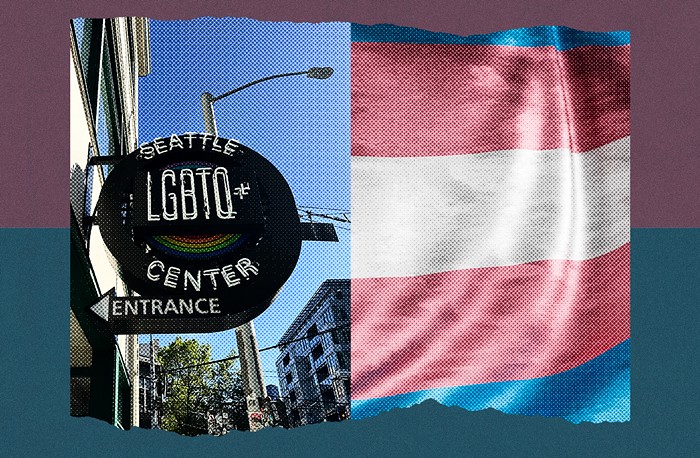Washington state advocates for queer, reproductive, and civil rights stand ready to fight school districts that violate the privacy or rights of students in Washington schools based on Initiative 2081, which sailed through the State Legislature this session with little resistance alongside two other initiatives from Let’s Go Washington, a conservative group funded by multi-millionaire Brian Heywood.
Essentially re-hashing this 2014 Louisiana law, I-2081, the so-called “Parents’ Bill of Rights,” allows parents to “examine” instruction materials, obtain student records, and opt their kids out of certain classroom activities.
More than two dozen organizations, including Planned Parenthood, Alliance Advocates, the Washington Education Association, QLaw Foundation, Lavender Rights Project, and the Greater Seattle Business Association signed onto a press release from Gender Justice League putting school boards on notice. They said they will be watching the way boards implement I-2081, which will take effect 90 days after the session ends and not impact students until next year.
Advocates say their issue lies not in what I-2081 says, but what it doesn’t say: The majority of the measure is totally redundant, restating federal and state law. In fact, at a Joint Early Learning & K-12 Education Committee hearing last week, Sen. Lisa Wellman said “probably 90 percent” of the initiative was already covered under state law and federal laws such as the Family Educational Rights and Privacy Act (FERPA) and HIPPA.
Legislative analysis from staff supported that view. Staff presented a table comparing the initiative’s major points to existing law and reassured lawmakers that the initiative would not amend current state law.
Over the phone last week, LGBTQ Caucus member Sen. Jamie Pedersen explained that to amend a law the initiative would have to reference specific statutes and show the changes it would make. He said that lawmakers could amend the bill to correct ambiguous language next session or earlier in the fall if any school district misuses it. Any conflicts could be hashed out in court, he said.
Experts who spoke to The Stranger in January couldn’t say exactly how local jurisdictions will implement the “Parents’ Bill of Rights.” Their concern was that vague language in the initiative could introduce confusion and enable districts to adopt policies that violate state and federal protections for students. Even districts that don’t intend to break existing laws might do so accidentally if they followed the language of I-2081 alone. As we reported in January, the devil is in the (lack of) details.
For example, one provision could give parents greater access to their kid’s school counseling records, potentially revealing truths about identity and mental health struggles that students aren’t ready to share, chilling what they’d be able to safely talk about with mental health providers on campus. Parental notification requirements could potentially lead to schools outing students for using different pronouns at school, or disclosing participation in Gay-Straight Alliances.
The expanded right of parents to “examine” their student’s curriculum could lead to additional book challenges, a trend that has already taken hold in Washington, or it could chill curriculum for all students.
While parents in Washington can already exempt their kids from sexual education classes, I-2081 would expand that provision to any topic “associated with sexual activity,” which could potentially include LGBTQ education or implied sex in books.
Advocates also told The Stranger that they worried teachers and administrative staff could be overwhelmed with questions and paperwork resulting from an influx of requests from parents, taking time and money away from educating students. Handling opt-out forms could be a logistical nightmare on their own, advocates said.
Courtney Normand, Washington director for Planned Parenthood Alliance Advocates, said the confusing language of the measure could be exploited to keep students from learning about their reproductive care options or from accessing resources to discuss their gender identities. Several organizations who testified in support of the bill last week, such as the Family Policy Institute of Washington, came out against SB 5599, a policy meant to help transgender youth in the shelter system.
“We know young people have these rights already–the Family Educational Rights and Privacy Act, HIPPA–those things are not touched by 2081, but it doesn’t mean that somebody isn’t going to decide they can anyway, again, because it’s poorly written.”
Danni Askini, executive director of Gender Justice League, said concerned members of the community may think that passing the initiative instead of launching a ballot measure campaign against it meant Democrats were throwing queer people under the bus, but that hasn’t been her experience. The LGBTQ caucus has actively sought input from the start, she said. She strongly suspects the courts will get involved.
“The vagueness of this bill is such that it really should not be left to chance–to hope and pray that school districts don’t go afoul,” she said. “We’re going to consider and pursue whatever avenues we can, including possibly getting clarification from the courts, sooner rather than later.”




















